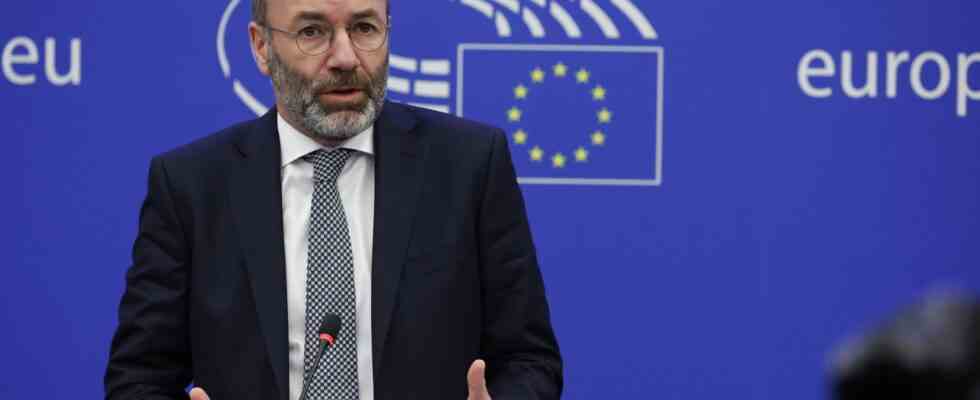Status: 04.02.2023 12:07 p.m
She is constructive in Europe and stands by Ukraine: EPP boss Weber does not see Italy’s right-wing head of state Meloni as contradicting the principles of his party family. There is broad criticism of the CSU politician.
Because of his contacts with Italy’s right-wing Prime Minister Giorgia Meloni, the chairman of the European People’s Party (EPP), Manfred Weber, is coming under increasing pressure. Members of his own group in the EU Parliament and other leading European politicians were appalled that the CSU deputy recently gave no clear rejection of an alliance with the right-wing Fratelli d’Italia (Brothers of Italy) – the Melonis party.
“The firewall to the right must always be in place – from Palermo to Wattenscheid, from Brussels to Rome,” said CDU MEP Dennis Radtke of the dpa news agency. The faction said that there was massive resistance to Weber’s course.
Weber sees Meloni in line with EPP principles
Weber, a CSU politician from Lower Bavaria, is not suspected of belonging to the right fringe, but he recently positioned his EPP with a remarkable statement about Meloni’s party. In an interview with the newspapers of the Funke media group, he said: Three fundamental principles of the EPP are “pro-the rule of law, pro-Europe, pro-Ukraine” – and “Meloni is constructive on Europe, stands by Ukraine, and when it comes to the rule of law there is Italy no problems”.
Although he shares the concern about the history of Meloni’s Fratelli d’Italia party, Weber continued in the interview. “But today we’re talking to each other about how we can solve Europe’s big questions together as Europeans.” Weber and Meloni have met twice in the past few months.
In addition to the CDU and CSU from Germany, the conservative EPP group in the EU Parliament includes the ÖVP from Austria and Forza Italia from Italy – one of Meloni’s coalition partners. Melonis Fratelli d’Italia, on the other hand, belong to the European Conservatives and Reformists (EKR) group – as do the national conservative Polish governing party PiS and Germany’s former AfD MP Lars Patrick Berg.
The EPP Group includes the Italian Forza Italia. Weber – here with Forza Vice President Antonio Tajani – was also involved in the election campaign.
Image: EPA
Since her election in September, Meloni has railed less against the EU than before and has generally made less radical statements than many had feared. But that’s not enough for Radtke and other EPP politicians. “We must not reduce our understanding of politics to pure power tactics,” said the CDU politician. Christophe Hansen, MP from Luxembourg, also sees a red line in an alliance with the Fratelli. Meloni’s party does not belong in the EPP, he tells the dpa. At the same time, he emphasizes that one has to work together with the Italian government, since it is elected and has so far spoken pro-European.
“No-Go” and “Unacceptable”
But even outside of the EPP, Weber’s relationship with Meloni causes a lack of understanding. The Vice President of the EU Parliament, Katarina Barley (SPD), spoke of an “absolute no-go”. Nicola Beer of the FDP, also Vice-President, accused Weber of “apparently having given up his political compass” in order to fish on the far right. For the Green European politician Anton Hofreiter, cooperation between the EPP group and the “post-fascist” Melonis party is “unacceptable,” he told the Funke newspapers.
CSU party leader Markus Söder has also commented. He had exchanged views with Weber on the subject for a “long time”, said Söder. Both agree that membership of Meloni’s party in the EPP is “out of the question”. “It’s not compatible,” he said. A formal coalition could “under no circumstances be wanted”.
Meloni was in Berlin on Friday for her inaugural visit to Chancellor Olaf Scholz. Central topics were above all the Russian war of aggression in Ukraine and refugee policy in Europe. Scholz and Meloni largely agreed on the subject of Ukraine, said the Chancellor. With regard to refugee policy, however, their views differed.

